Key Takeaways
- Divorce can significantly impact federal pensions, requiring careful planning to protect your financial future.
- Knowing how to navigate the division of federal benefits and assets ensures you retain what you’re entitled to while staying compliant with legal processes.
Understanding the Impact of Divorce on Federal Pensions
Divorce is a challenging life event, and for federal employees or retirees, it adds a layer of complexity to asset division. Your federal pension and benefits are often among the most valuable assets in the marriage, making them a central point of negotiation. Knowing how these benefits are treated in a divorce is crucial for protecting your financial interests.
What’s at Stake?
- Also Read: Divorce and Your Federal Pension—What Happens When You Split Assets and How It Could Affect Your TSP
- Also Read: What Happens to Your Federal Benefits After Divorce? Here’s the Lowdown
- Also Read: The Best FEHB Plans for 2025: Which One Fits Your Lifestyle and Budget the Best?
Federal Pension Plans: FERS vs. CSRS
The type of retirement plan you’re under can influence how your pension is divided.
- FERS (Federal Employees Retirement System): This newer plan covers most federal employees and includes a pension, Social Security benefits, and TSP.
- CSRS (Civil Service Retirement System): A more generous system for those hired before 1984. CSRS retirees often don’t qualify for Social Security but have larger pensions.
In both cases, federal pensions can be split between you and your ex-spouse through a court order called a Court Order Acceptable for Processing (COAP). This document provides the legal framework for dividing your retirement benefits.
How Divorce Affects Your Pension
The Role of State Law
While federal pensions are governed by federal law, state law dictates whether they’re considered marital property. In community property states, assets earned during the marriage are split 50/50, while equitable distribution states divide assets in a manner deemed fair but not necessarily equal.
The COAP Explained
A COAP is essential for dividing federal pensions. It outlines how much of your pension your ex-spouse will receive and ensures compliance with federal regulations. Without this court order, your agency cannot legally distribute benefits to your ex-spouse.
Tips to Protect Your Interests
Know Your Plan’s Value
Before negotiating, determine the value of your pension. Request an Estimate of Benefits from your agency or use the federal retirement calculator to get a clear picture. The total worth of your pension will significantly affect settlement discussions.
Hire a Knowledgeable Attorney
Work with a lawyer familiar with federal benefits and the COAP process. They’ll ensure your pension is divided fairly and advocate for terms that protect your future income.
Division of the Thrift Savings Plan
Your TSP is also subject to division in divorce. Similar to a pension, it requires a court order—known as a Retirement Benefits Court Order (RBCO)—to allocate funds to your ex-spouse.
Key Considerations
- Timing: Transfers occur after the court order is submitted and processed.
- Tax Implications: Funds withdrawn by your ex-spouse are taxed at their rate, not yours.
- Loans: Any outstanding TSP loans remain your responsibility and aren’t shared.
Social Security and Divorce
For FERS retirees, Social Security benefits can also be a factor. Your ex-spouse may be entitled to claim Social Security based on your work record if:
- The marriage lasted at least 10 years.
- They are unmarried and at least 62 years old.
- Their Social Security benefits are lower than what they’d receive based on your record.
This doesn’t reduce your benefit amount but can still impact your financial planning.
Survivor Benefits and Divorce
Federal pensions often include survivor benefits, providing ongoing income to a designated beneficiary after your death. After a divorce, your ex-spouse can retain survivor benefits if ordered by the COAP.
Should You Agree to Survivor Benefits?
Granting survivor benefits may be required in the settlement, but doing so can reduce your monthly pension payments. Discuss with your attorney whether this trade-off is worth it, and ensure the COAP specifies who will cover the cost of survivor benefits.
Health Insurance and FEHB
Divorce also impacts your Federal Employees Health Benefits (FEHB) coverage. Your ex-spouse loses eligibility for FEHB under your plan, but they may qualify for Temporary Continuation of Coverage (TCC), which they’ll pay for out of pocket.
Protecting Your Coverage
- If you’re retired, coordinating FEHB with Medicare is critical to maintaining affordable healthcare.
- Ensure any court orders don’t inadvertently disrupt your coverage.
Navigating the Process
Step 1: Gather Documentation
Start by collecting detailed information about your federal benefits, including:
- Pension plan statements.
- TSP balances and loan information.
- FEHB and FEGLI details.
This gives you a comprehensive view of what’s at stake.
Step 2: File Appropriate Court Orders
Work with your attorney to prepare and submit the COAP or RBCO to the Office of Personnel Management (OPM) or the TSP. Double-check that all details match your divorce decree.
Step 3: Communicate with Agencies
Follow up with OPM, TSP, and other relevant agencies to ensure your orders are processed accurately. This avoids delays or errors in the division of assets.
Financial Planning After Divorce
Divorce reshapes your financial future. Use this opportunity to:
- Reassess Retirement Goals: Adjust your savings and investment strategies to account for changes in income or assets.
- Update Beneficiaries: Remove your ex-spouse from any retirement accounts, life insurance policies, or wills unless required by the court.
- Consult a Financial Planner: Get professional advice to rebuild your financial security.
Why Being Proactive Matters
Taking charge of your federal benefits during a divorce ensures you don’t lose out due to oversight or misinformation. Many retirees find themselves unprepared for the financial impact of divorce, but with the right strategies, you can minimize losses and protect your future.
Final Words: Safeguard Your Retirement
Divorce can be an emotional and financial rollercoaster, but when it comes to federal pensions, preparation is key. Understanding your rights, the legal processes involved, and the long-term effects on your benefits allows you to make informed decisions and emerge from the process with your retirement plans intact.











